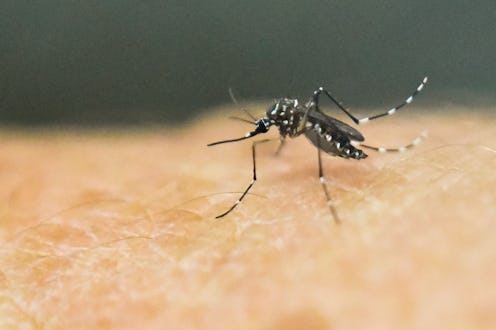News
How To Help Stop The Zika Virus
The Zika virus, spread by pesky Aedes aegypti mosquitoes, has been detected in more than 20 countries and is expected to reach every nation in North and South America, excluding only Canada and Chile. Since the virus is transmitted through mosquito bites, not from person to person, it's difficult for individuals to combat the outbreak, but there are a few ways you can help stop the Zika virus' spread.
First of all, if you live in an area where Aedes mosquitoes exist — mostly the southern United States — it's important to make your home and yard inhospitable environments for the insects. Anything that holds water outside your house, from outdoor pots to animals' drinking bowls, should be removed or adjusted so that they no longer hold water. Keeping your yard clean, with the grass mowed and bushes trimmed, can also help eliminate mosquitoes, according to Vox. The Centers for Disease Control and Prevention (CDC) recommends using window and door screens, as well as an air conditioner, to keep them out of your home.
More pressing than keeping mosquitoes away from your own home though is preventing the spread of the virus by protecting yourself when traveling to the affected Latin America countries. Use insect repellent, wear long sleeves and pants, and sleep under a mosquito net if the building you're staying in doesn't have screens on the doors and windows.
Informing your family and friends about the virus and preventative measures will also keep more people Zika-free — the more people know about it, the less likely they are to contract it. Essentially, prevention is the major way everyone can help minimize Zika's reach.
If you already have Zika, you can help stop the virus by avoiding further mosquito bites, especially during the first week of the illness. According to the CDC, mosquitoes can contract it through the blood of an infected person, allowing that mosquito to then infect more people.
Although it hasn't been confirmed, two cases suggest that the virus can be sexually transmitted. Dr. William Schaffner, chief of preventive medicine at Vanderbilt University Medical School, told The New York Times' Donald McNeil Jr. that two suspect cases "are not really enough to warrant a large public health recommendation from the CDC. But it's provocative, so someone else could recommend it. And it certainly should be studied." So, if you want to be extra careful, avoid unprotected sex while you're infected.
As the Zika virus quickly spreads across the Americas, take the appropriate measures to keep yourself safe and avoid widening its impact.
Images: Pan American Health Organization (1)
